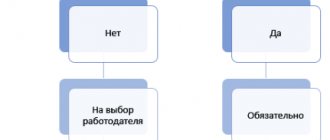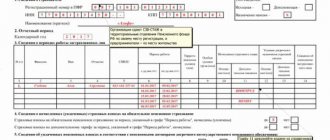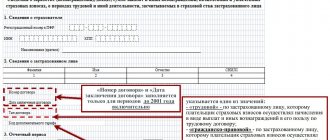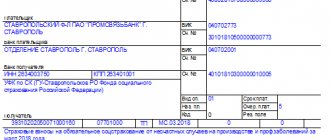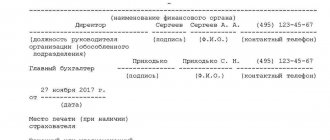Insurance premiums - what are they and who should pay them?
Criminal liability for non-payment of insurance premiums in 2020
Fine for non-payment of insurance premiums
Is criminal liability introduced for individuals for non-payment of insurance premiums?
Responsibility for non-payment of contributions for legal entities
Responsibility for non-payment of contributions in case of injury for individuals
Responsibility for non-payment of contributions in case of injury for legal entities
Consequences of non-payment of insurance contributions to the Pension Fund of the Russian Federation
Responsibility of defaulters - nuances that are worth paying attention to
Insurance premiums - what are they and who should pay them?
For each employee engaged in labor activities, the employer must pay insurance premiums. An entrepreneur working individually (without hiring assistants) must pay the same fees, although in this case he will have to do it only for himself.
Insurance premiums paid by the employer make it possible to create funds, the funds from which are used to provide for certain social needs. Thus, pension contributions are used to pay pensions to disabled citizens, and social insurance contributions are used to pay benefits to citizens who have temporarily lost their ability to work (for example, upon the birth of a child or the onset of a disease). Insurance premiums for medical care form a financial reserve that provides financing for healthcare institutions. This allows any person with a compulsory medical insurance policy to receive medical care completely free of charge in a public clinic or hospital in any city in the country.
You can find more complete information on the topic in ConsultantPlus. Full and free access to the system for 2 days.
Timely fulfillment by policyholders of their obligations to pay contributions is the key to replenishment of funds that make it possible to provide the population with decent social protection. That is why legislators decided on the need to tighten the penalties imposed on policyholders for evading the obligation to pay contributions.
Criminal liability for non-payment of insurance premiums in 2020
With the advent of 2020, the powers to monitor the fulfillment by entrepreneurs and organizations of their obligations to pay contributions were transferred to the tax authorities. This decision was due to the high efficiency of tax authorities in the collection of mandatory payments. The competence of extra-budgetary funds remains only with the collection of so-called contributions for injuries. It, as before, must be transferred to the Social Insurance Fund.
The introduction of liability of policyholders for non-payment of mandatory contributions into criminal law is another legal measure aimed at increasing the volume of payments received from individuals and legal entities.
Criminal liability was established for non-payment of insurance premiums by the federal law “On Amendments...” dated July 29, 2017 No. 250. The law came into force on August 10, 2020 - from that moment on, evasion of obligations for the calculation and payment of pension contributions, as well as contributions to Medical insurance and disability insurance (including due to maternity leave) have officially become a criminal offense. At the same time, the updated Criminal Code of the Russian Federation, despite the fact that the Federal Tax Service does not control contributions for injuries, holds policyholders responsible for failure to fulfill obligations and for their payment.
The fee will be pinched
Criminal liability has been introduced for non-payment of insurance premiums. On Thursday, Federal Law 250 of July 29, 2020 will come into force. He extended the effect of Articles 198 and 199 of the Criminal Code to policyholders who evade paying premiums. Previously, they could only be fined.
Evasion from paying contributions is recognized as a crime if committed on a large or especially large scale. The amount is considered large if the amount of arrears exceeds 15 million rubles. Or, alternatively, the amount of unpaid taxes and fees must exceed 5 million rubles for three consecutive financial years. At the same time, the share of unpaid taxes and fees exceeds 25 percent of the amount that should have been paid to the budget.
A particularly large size is 45 million rubles. Or 15 million rubles for three financial years in a row with the share of unpaid taxes and contributions exceeding half of the amount to be transferred to the budget.
For citizens the conditions are different. If an individual who pays insurance premiums evades paying them on a large scale, he may be fined 100-300 thousand rubles or arrested for up to one year. For particularly large cases, legislators provided for arrest for up to three years. If the payer of insurance premiums is an organization, then officials may be imprisoned for a term of two to six years.
In this case, the unpaid amount may include arrears not only of insurance premiums, but also of taxes and fees. “Lawmakers have equated liability for non-payment of insurance premiums with liability for non-payment of taxes,” states Yulia Skorb, an expert at SKB Kontur. “This measure was quite expected after the transfer of administration of insurance premiums to the Federal Tax Service.”
At the same time, liability for non-payment of insurance premiums for injuries (social insurance against industrial accidents and occupational diseases) is being tightened. For this purpose, two new articles were introduced into the Criminal Code. A large and especially large amount of arrears is also established here (for organizations, for example, without additional conditions on the share - 6 million and 30 million rubles). If the crime is committed for the first time, then criminal liability can be avoided. To do this, you will need to pay off the arrears, as well as pay penalties and fines. Otherwise, an individual may be imprisoned for up to one year, and officials of organizations - for up to four years.
According to the first vice-president of OPORA Russia, Pavel Segal, this measure will undoubtedly contribute to the growth of contributions to social funds. “But criminal liability still creates great risks for abuse by regulatory authorities. By and large, the process of evading insurance premiums is very well administered, and those who want to evade payments to the budget and social funds do it in a fundamentally different way.”
The tightening will only affect persistent defaulters. For everyone else, the Ministry of Finance explained that if contributions are correctly calculated and reflected correctly in the calculation, although not paid on time, then violators only face a fine. In such a situation, payers are promised not to be fined.
Payers of insurance premiums need not to miss another important nuance. From October 1, the procedure for calculating penalties will change, warns Yulia Skorb. “If payment is late by up to 30 calendar days, the penalty will be calculated based on one three hundredth of the Bank of Russia refinancing rate, as usual. Beyond this period, starting from the 31st day, the penalty will be one hundred and fiftieth of the discount rate,” the expert explained. But this only applies to companies; for individuals, including individual entrepreneurs, everything remains the same.
Insurance Legal Consultation ” project you understand complex cases related to
the application of 250-FZ of July 29, 2020 , as well as other issues of payment of insurance premiums .
Fine for non-payment of insurance premiums
Until August 2020, the amount of fines imposed on policyholders who do not fulfill their obligations to make contributions to extra-budgetary funds was determined by the currently inactive federal law “On Insurance Contributions...” dated July 24, 2009 No. 212. The maximum amount of the fine established by this law , amounted to 40% of the total debt. In general cases, debtors were charged only 20% of the arrears they incurred.
Amendments made to the Criminal Code of the Russian Federation established fines, the amount of which depends on various factors:
- type of contribution (for the formation of a fund for the payment of compensation to persons who received work-related injuries, or other sources of social and pension financing);
- the amount of arrears;
- category of the insured (legal entity or individual).
Personal income tax fine for late payment in 2020: article and amount of punishment, payment
What liability is provided specifically for personal income tax, in what cases it is applicable, regarding payers, as well as which BCCs of the 2020 personal income tax fine are provided for by tax legislation, we will consider in this article.
Deadline for payment of personal income tax by a tax agent so that there are no fines
- absence of earlier delays for individual entrepreneurs and individuals. faces;
- inability to prove malicious intent;
- admission of guilt, attempt to negotiate;
- conscientious payment of taxes;
- pre-bankruptcy;
- bankruptcy;
- dismissal of an accountant, search for a new employee;
- status of a budgetary and city-forming company;
- non-profit nature of the organization's activities.
- The fine for late payment of the fee is 5% of the amount of arrears (but not more than 30% of the total fee);
- Failure to submit a contribution document on time - a fine of 200 rubles;
- The minimum amount of the fine, according to the requirements of the Tax Code of the Russian Federation, is from 1 thousand rubles;
- Understating the base from which the contribution amount is calculated is a fine of up to 40% of the amount of the arrears.
We recommend reading: Examples of filling out Declaration 3 Personal Income Tax for Education of Children 2020
Advice . You can send reports and pay all necessary fees automatically, without involving an accountant. To do this, you just need to register in the “My Business” online service, which will become an indispensable assistant for you in matters of paying taxes, mandatory deductions and contributions.
What shortcomings and arrears cannot become the basis for the application of fines and sanctions?
IP, like any legal entity, must submit reports to extra-budgetary funds quarterly or once a year and make appropriate payments.
According to the Tax Code of the Russian Federation, for non-payment or incomplete payment of insurance premiums as a result of underestimation of the base for their accrual, incorrect calculation of contributions or other violations, a fine is provided in the amount of 20% of the unpaid amount of contributions (Article 1, Article 122 of the Tax Code of the Russian Federation). For deliberate non-payment of contributions or incomplete payment, tax authorities will be fined 40% of the unpaid amount (clause 3 of Article 122 of the Tax Code of the Russian Federation).
Is criminal liability introduced for individuals for non-payment of insurance premiums?
According to the provisions of Part 1 of Art. 198 of the Criminal Code of the Russian Federation, evasion of payment of contributions is the failure to submit to the regulatory authority documents containing the calculation of the amount of payments, or the inclusion in such papers of information that is obviously untrue.
For policyholders whose violation was recognized as major, the punishment is established by Part 1 of Art. 198 of the Criminal Code, according to which a fine of 100 to 300 thousand rubles may be imposed on an individual. In some cases, the court may decide to impose a fine in the amount of the offender’s earnings received over 1–2 years.
The court may also impute to the defaulter as punishment:
- forced labor (no longer than a year);
- arrest (maximum six months);
- imprisonment (for up to a year).
The same offense, but committed on an especially large scale, entails the imposition of a fine on an individual in the amount of 200-500 thousand rubles. The court may also impose a fine equivalent to the defaulter’s earnings for a period of 1.5 to 3 years, subject him to forced labor or imprison him for a period not exceeding 3 years.
Subscribe to our newsletter
Read us on Yandex.Zen Read us on Telegram
The criteria by which debt can be classified as large or especially large are given in the appendix to Art. 198 of the Criminal Code of the Russian Federation.
Responsibility for non-payment of contributions for legal entities
Provisions of Art. 199 of the Criminal Code of the Russian Federation provides for punishment of heads of organizations for evading the fulfillment of their obligations to pay contributions to the Federal Tax Service. The organization itself cannot be held accountable under the Criminal Code of the Russian Federation for such a violation.
A violation committed on a large scale may entail, in accordance with Part 1 of this article, the imposition of a fine on the offender in the amount of 100 to 300 thousand rubles. or salary or other income that he may receive for a period of 1 to 2 years. The punishment can also be non-financial: the legal representative of a legal entity who has committed a violation of the Criminal Code of the Russian Federation may be charged with forced labor for no more than 2 years. In some cases, the defaulter may be arrested for up to six months or imprisoned for up to 2 years. It remains at the discretion of the court to impose a ban on the performance of certain professional duties - the maximum period of such a restriction is 3 years.
Punishment for violation of the law committed on an especially large scale (including by a group of persons) is determined by Part 2 of Art. 199 of the Criminal Code of the Russian Federation. Violators will have to pay a fine of 200 to 500 thousand rubles. or transfer to the state the equivalent of your income received over a period of time from 1 to 3 years. In addition, it is possible to be subjected to forced labor (for no more than 5 years), or imprisonment (for no more than 6 years). An additional penalty may be the imposition of a court ban on holding certain positions for a period not exceeding 3 years.
It is worth remembering that the amount of debt that allows you to assign the status of large or especially large depends on what category the insured belongs to and to which regulatory body the debt has formed.
“Evasion of payment” of insurance premiums is a deliberate act
Payment evasion is the deliberate actions of the payer, due to which money does not flow into the state budget. In this case - insurance premiums.
The following may be subject to criminal liability:
- founders;
- general director;
- chief accountant;
- individual entrepreneur.
If a group of people is accused of payment evasion, then the investigation will have to prove the participation and degree of responsibility of each of them.
The law punishes:
- for indicating knowingly false data in a tax return and other forms of reporting (for example, underestimating the base for calculating insurance premiums);
- for inaction, expressed in failure to submit all required documents (if organizations or individual entrepreneurs, contrary to the law, ignore filing reports on insurance contributions to the tax and social insurance services).
When an accountant does not provide calculations on approved forms or shows inaccurate amounts of contributions, underestimating the basis for calculation, then all these actions will be considered evasion. It does not matter whether he did this on the instructions of his superior or on his own initiative.
For example, the director of an enterprise instructs the accountant to give part of the wages to employees “in envelopes.” In this situation, the amount from which insurance premiums should be calculated will be underestimated, and the insurance premiums themselves will also be underpaid. Both the director and the accountant face criminal penalties.
The table shows the classification of non-payment amounts - which amount is considered large and which is considered especially large. Depending on this, the punishment will vary.
| Insurance premiums for medical, pension insurance in case of temporary disability and in connection with maternity | ||
| Large size | Extra large size | |
| Organization | More than 5 million rubles for three financial years in a row (when non-payment is more than 25% of the amount to be paid); An amount exceeding 15 million rubles (if the amount of non-payment does not exceed 25%). | More than 15 million rubles for three years in a row (when non-payment is more than 50% of the amount to be paid); An amount exceeding 45 million rubles. |
| IP | More than 900 thousand rubles (when non-payment is more than 10% of the amount to be paid); An amount exceeding 2.7 million rubles. | More than 4.5 million rubles (when non-payment is more than 20% of the amount to be paid); An amount exceeding 13.5 million rubles. |
| Accident insurance | ||
| Large size | Extra large size | |
| More than 2 million rubles (when non-payment is more than 10% of the amount to be paid); An amount exceeding 6 million rubles. | More than 10 million rubles (when non-payment is more than 10% of the amount to be paid); An amount exceeding 30 million rubles. | |
Classification of amounts of non-payment of insurance premiums
If the tax service during an audit reveals that an individual entrepreneur or other organization does not pay insurance premiums in a large or especially large amount, liability arises under Articles 198 and 199 of the Criminal Code of the Russian Federation. In this case, arrears are taken into account within three financial years in a row. Arrears in insurance premiums are added to tax arrears.
If an organization has 5 million rubles in tax debt, and has not yet paid 300,000 rubles in insurance premiums, then the total amount will be 5 million 300 rubles - non-payment on a large scale.
Payment evasion is the deliberate failure to submit documents to the Federal Tax Service and the Social Insurance Fund or the inclusion of false data in reporting. The founder, general director, chief accountant and individual entrepreneur can be held liable.
Responsibility for non-payment of injury contributions for individuals
According to the provisions of Part 1 of Art. 199.3 of the Criminal Code of the Russian Federation, evasion of insurance of workers against the consequences of industrial injuries and occupational diseases can be recognized:
- Intentional misrepresentation of the size of the basis used to determine the payment amount.
- Other actions leading to incorrect determination of the amount of debt and its reduction.
- Failure to submit documents containing the calculation of contributions, or deliberate changes in the information included in them.
Sanctions against an individual for failure to pay such contributions on a large scale are determined by Part 1 of Art. 199.3 of the Criminal Code of the Russian Federation. Thus, a fine of up to 200 thousand rubles may be imposed on the defaulter. or equal to earnings for a period not exceeding 2 years. Instead of a financial penalty, the defaulter may be forced to perform compulsory work lasting up to 360 hours.
Punishment for the same crime, but of a particularly large size, is established by Part 2 of Art. 199.3 of the Criminal Code of the Russian Federation. In this case, the individual may be fined (up to 300 thousand rubles). The court may also decide to collect an amount equivalent to the violator’s earnings for a period not exceeding 3 years. In addition, the policyholder may be subject to forced labor for up to 1 year or imprisoned for the same period.
Fines and penalties for late payment
A person is responsible for failure to comply with deadlines even if the contribution amount has been paid, but not in full. This punishment by the authorities is introduced due to the fact that the absence of the amount of the insurance premium (or its incomplete amount) will cause an underestimation of the base.
The insurance premium is considered incomplete if:
- the final payment amount does not include separate payments to employees, including bonuses and allowances to staff for the quarter;
- When calculating the final amount, incorrect tariffs (lower ones) were used, as a result of which the final monetary total was calculated incorrectly;
- the absence of other tax deductions necessary for payment of tax in the insurance premium.
How to get a deferment on payment of insurance premiums? Watch the video:
Size
It is worth noting that from the moment the Russian Tax Services began to control the activities of enterprises in this area, the punishment for violating the law has become more severe.
What are additional insurance premiums and how are they calculated? Find out here.
Immediately after recording such a violation, representatives of the tax sphere will demand not only to pay the fee, but will also charge a penalty or a fine for late payment. They are formed as follows: a certain percentage is charged from the amount of the unpaid contribution (20%,40%).
It depends on one factor - the presence of intent in not meeting deadlines. If during the proceedings the representatives of the law can prove that the delay occurred intentionally, then the percentage will be equal to 40.
If this situation occurred due to a certain accident, then the interest on the unpaid amount is 20%.
If the report on insurance premiums was submitted to the Federal Tax Service for consideration, but the amount itself was not transferred, then the individual entrepreneur or organization is subject to a penalty in the form of a fine. They are charged for each day of delay.
Insurance premiums for individual entrepreneurs.
The amount is calculated based on a ratio of 1:300 to the Central Bank refinancing rate. Penalties are not applied in such situations.
Responsibility for non-payment of contributions for injuries for legal entities
The liability to which the legal representative of an insured who has the status of a legal entity and does not fulfill his obligations to make payments to the Social Insurance Fund may be held is determined by Art. 199.4 of the Criminal Code of the Russian Federation.
According to Part 1 of this article, an offense committed by the head of a legal entity on a large scale is punishable by a fine in the amount of 100 to 300 thousand rubles. The amount of recovery can also be determined in relation to the policyholder’s earnings - in this case, he will have to pay an amount equal to the income received over a period of one to two years. In addition, he can be punished by forced labor for up to 1 year with a ban on carrying out certain activities for up to 3 years or imprisonment for up to 1 year.
In Part 2 of Art. 199.4 of the Criminal Code of the Russian Federation establishes a list of sanctions applied to the heads of legal entities that fail to pay contributions on a particularly large scale. Such insurers may be fined an amount ranging from 300 to 500 thousand rubles, or equivalent to the amount of earnings for a period of 1 to 3 years. The violator may be subject to forced labor for up to 4 years with a ban on work in a certain area for the same period, or imprisoned for up to 4 years with a ban on holding certain positions for up to 3 years.
Types of liability for violations
If the policyholder violated the deadlines for making insurance contributions to extra-budgetary funds, he will be punished. Primarily punishment involves two types of measures:
- penalties, which are accrued for each day of delay (in the form of a percentage of the missing amount);
- penalties that are imposed for non-payment in a fixed amount.
These forms of penalties are provided for by current legislation.
There is one key feature regarding these types and forms of payments. They cannot be provided to the fund through an advance. Payment is made upon receipt of salary. So the sanctions applied are justified and cannot be challenged.
The percentage of penalties remains unchanged. In simple words, the degree of fault for the delay does not have any impact on the final amount of penalties accrued.
In general, the amount of the fine varies. Initially, it is 20% of the withheld contributions.
But if fund employees can provide evidence of intentionality in actions related to non-payment of contributions, the amount of the fine will be increased to 40%.
There are two main departments under whose close control the general discipline for paying penalties is:
- FSS of the Russian Federation, if we are talking directly about contributions in connection with temporary disability;
- Pension Fund, if we talk directly about health and pension insurance.
It is these services that charge penalties due to delays, and they also act as initiators of procedures for calculating penalties.
An important role is played by compliance with the principle by which penalties are calculated:
P = SV * KS / 300 * K(DN)
- the required value is a penalty for all periods of delay;
- SV – amount of insurance premiums;
- KS – base rate;
- K (DN) – the number of days during which the delay was valid.
The calculation of the fine is carried out in accordance with tax legislation and includes similar positions and principles.
Consequences of non-payment of insurance contributions to the Pension Fund of the Russian Federation
The above sanctions, which await policyholders who do not fulfill their obligations to pay contributions to pension, social and health insurance, do not always apply. The tightening of criminal legislation will only affect persistent defaulters. In the event that insurance premiums were not paid on time, but the calculation of their amount was made correctly and correctly reflected in the generated reports, violators only face the accrual of penalties for violating the deadlines established by the legislator. The amount of the penalty is established by current legislation and is directly dependent on the refinancing rate fixed by the Central Bank of the Russian Federation.
The policyholder may be released from punishment even if he violated the law for the first time and the debt resulting from unpaid insurance premiums and penalties accrued on it is fully repaid. This rule applies to all categories of payers, regardless of which body (Federal Tax Service or Social Insurance Fund) they did not transfer funds in a timely manner, as is directly indicated by the provisions of Part 3 of Art. 198, part 2 art. 199, part 2 art. 199.3, part 2 art. 199.4 of the Criminal Code of the Russian Federation.
Judicial practice on bringing negligent payers to criminal liability is still being formed. The decisions made in 2017 relate to those offenses that were committed before the amendments to the Criminal Code of the Russian Federation came into force.
The procedure for collection and the amount of the fine, the elements of the offense
Previously, a set of fines that were imposed for the lack of contributions to the Social Insurance Fund was prescribed by Federal Law No. 212, which has become invalid. For non-payment, the policyholder was required to return up to 20% of the amount in addition to it, and for a proven fact of malicious intent - 40%. Starting from 2017, these offenses are considered tax offenses. And establishing responsibility for them is the prerogative of Art. 122 of the Tax Code of the Russian Federation.
The company has an obligation to pay contributions, which is carried out no later than the 15th day of the month following the moment of accrual.
If this time period falls on a weekend, the transfer is acceptable on the next day of work. If there is a delay, a penalty will follow.
The fine is also valid if the organization has underestimated the base, or if errors have occurred in the process of calculating payments, which is prescribed in Art. 122 of the Tax Code of the Russian Federation.
Penalties directly related to contributions for injuries are prescribed under Art. 19 Federal Law No. 125 of July 24, 1998. If they are not paid, a penalty will follow in the form of a fine ranging from 20 to 40% of the amount that was not paid.
Not long ago, the Ministry of Finance issued new clarifications regarding fines for non-payment of insurance premiums.
In a letter numbered 03-02-07/1/31912, officials concluded that inspectors will not fine organizations if they pay the sanctions after this period, but payment of contributions will be made on time. In this situation, only penalties will be charged.

